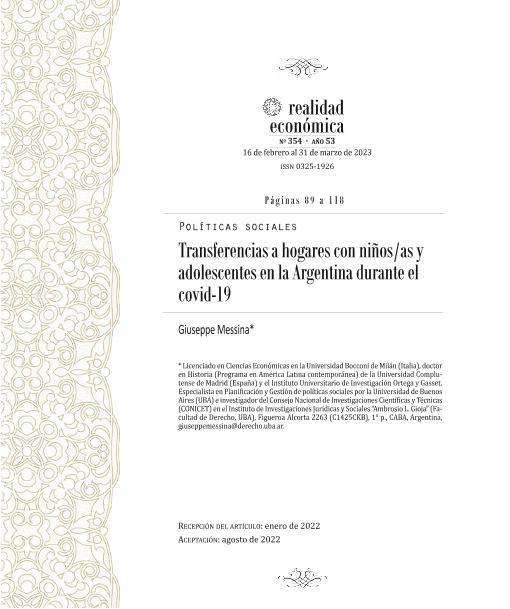Mostrar el registro sencillo del ítem
dc.contributor.author
Messina, Giuseppe Manuel

dc.date.available
2023-12-27T14:05:10Z
dc.date.issued
2023-04
dc.identifier.citation
Messina, Giuseppe Manuel; Transferencia a hogares con niños, niñas y adolescentes en la Argentina durante el COVID-19; Instituto Argentino para el Desarrollo Económico; Realidad Económica; 53; 354; 4-2023; 1-30
dc.identifier.issn
0325-1926
dc.identifier.uri
http://hdl.handle.net/11336/221582
dc.description.abstract
El artículo discute las debilidades y fortalezas del sistema argentino de protección de ingresos de los hogares con niños, niñas y adolescentes (NNyA) en el contexto del primer año de la crisis del covid-19. con este objetivo, se describe el preexistente sistema de asignaciones familiares ‒en particular la Asignación Universal por Hijo (AUH)‒ y los nuevos programas de transferencias que entraron en vigor durante la pandemia como la tarjeta Alimentar y el Ingreso Familiar de Emergencia (IFE). Luego se realiza un estudio empírico de los impactos de la crisis sobre los hogares con NNyA y el grado en que las transferencias de ingresos (no contributivas) compensaron la pérdida de ingresos laborales y moderaron el incremento de la pobreza y la indigencia. Los resultados muestran un efecto de las transferencias mayor sobre la indigencia que sobre la pobreza, especialmente en hogares sin inserción laboral formal con niños/as de hasta 6 años, que pudieron acumular los beneficios de AUH, Alimentar e IFE. Al mismo tiempo, el IFE favoreció relativamente más a los hogares sin NNyA, donde se observan tasas de pobreza e indigencia más bajas.
dc.description.abstract
the article discusses the weaknesses and strengths of the argentine system of income protection for households with children and adolescents (nnya) in the context of the first year of the covid-19 crisis. to this end, we describe the pre-existing system of family allowances -particularly the universal child allowance (auH)- and the new transfer programs that came into effect during the pandemic, such as the aliMentaR card and the emergency Family income (iFe). an empirical study is then carried out on the impacts of the crisis on households with children and adolescents and the degree to which income transfers (non-contributory) compensated for the loss of labor income and moderated the increase in poverty and indigence. the results show a greater effect of the transfers on indigence than on poverty, especially in households without formal labor insertion with children up to 6 years of age, which were able to accumulate the benefits of auH, aliMentaR and iFe. at the same time, the iFe favored relatively more households without children, where lower poverty and indigence rates are observed.
dc.format
application/pdf
dc.language.iso
spa
dc.publisher
Instituto Argentino para el Desarrollo Económico
dc.rights
info:eu-repo/semantics/openAccess
dc.rights.uri
https://creativecommons.org/licenses/by-nc-nd/2.5/ar/
dc.subject
ARGENTINA
dc.subject
PROTECCIÓN SOCIAL
dc.subject
TRANSFERENCIAS DE INGRESOS
dc.subject
COVID-19
dc.subject.classification
Ciencias Sociales Interdisciplinarias

dc.subject.classification
Otras Ciencias Sociales

dc.subject.classification
CIENCIAS SOCIALES

dc.title
Transferencia a hogares con niños, niñas y adolescentes en la Argentina durante el COVID-19
dc.title
Income transfers to households with children and adolescents in Argentina during covid-19
dc.type
info:eu-repo/semantics/article
dc.type
info:ar-repo/semantics/artículo
dc.type
info:eu-repo/semantics/publishedVersion
dc.date.updated
2023-12-27T12:35:27Z
dc.journal.volume
53
dc.journal.number
354
dc.journal.pagination
1-30
dc.journal.pais
Argentina

dc.journal.ciudad
Buenos Aires
dc.description.fil
Fil: Messina, Giuseppe Manuel. Consejo Nacional de Investigaciones Científicas y Técnicas; Argentina
dc.journal.title
Realidad Económica

dc.relation.alternativeid
info:eu-repo/semantics/altIdentifier/url/https://ojs.iade.org.ar/index.php/re/article/view/184
Archivos asociados
